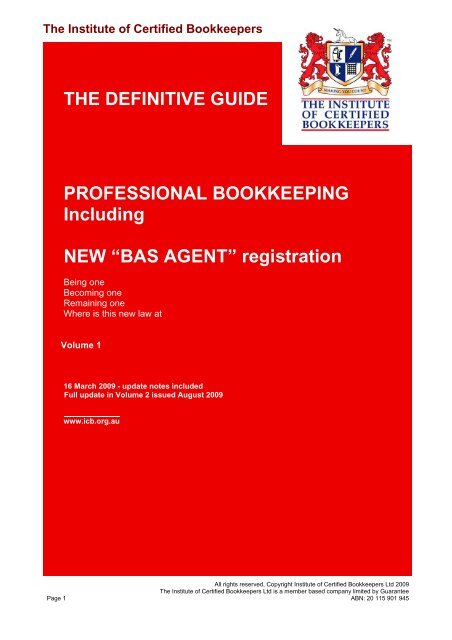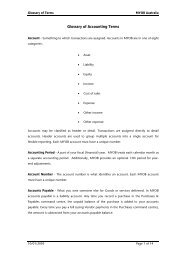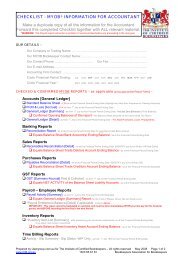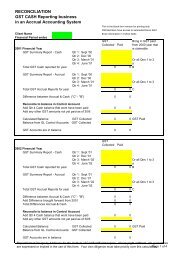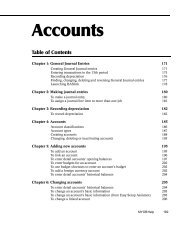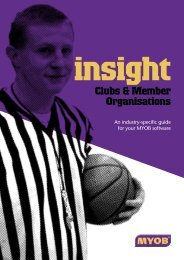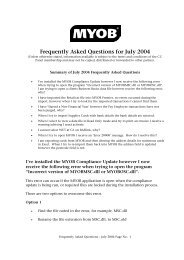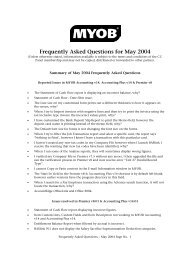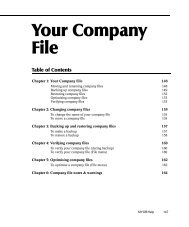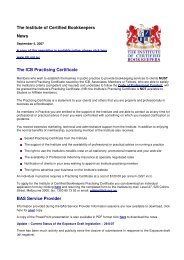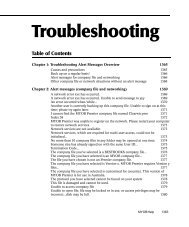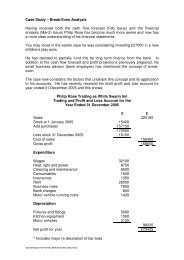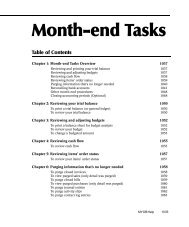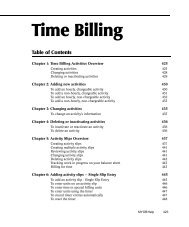BAS AGENT - Institute Of Certified Bookkeepers
BAS AGENT - Institute Of Certified Bookkeepers
BAS AGENT - Institute Of Certified Bookkeepers
- No tags were found...
You also want an ePaper? Increase the reach of your titles
YUMPU automatically turns print PDFs into web optimized ePapers that Google loves.
The <strong>Institute</strong> of <strong>Certified</strong> <strong>Bookkeepers</strong>THE DEFINITIVE GUIDEPROFESSIONAL BOOKKEEPINGIncludingNEW “<strong>BAS</strong> <strong>AGENT</strong>” registrationBeing oneBecoming oneRemaining oneWhere is this new law atVolume 116 March 2009 - update notes includedFull update in Volume 2 issued August 2009www.icb.org.auAll rights reserved, Copyright <strong>Institute</strong> of <strong>Certified</strong> <strong>Bookkeepers</strong> Ltd 2009The <strong>Institute</strong> of <strong>Certified</strong> <strong>Bookkeepers</strong> Ltd is a member based company limited by GuaranteePage 1 ABN: 20 115 901 945
Finally, <strong>Bookkeepers</strong> are recognised for their great contribution<strong>Bookkeepers</strong> are the key to many businesses meeting their <strong>BAS</strong> obligations and coping with their GSTobligations.Finally the Australian Parliament is in the final steps of considering a piece of legislation that for the first timeproperly recognises the contribution and value of contract bookkeepers.It is estimated that 500,000 small businesses use contract bookkeepers in some form to assist with theirrecord processing, their payroll, their keeping of the books, the review and preparation of the <strong>BAS</strong> and theirpreparation of information for accountants year end and income tax requirements.Since its inception in Australia, ICB have created the recognition that there are different levels ofbookkeepers providing different levels of services, but more importantly ICB have provided the mechanism toensure that good professional bookkeepers are creditable, that they are resourced & competent, that theyare identified at their level of expertise. Finally, there will be recognition in law, of part of the bookkeepercommunity with the creation of the “Registered <strong>BAS</strong> Agent”.The Tax Agent Services Act 2009 has been passed through parliament as of 12 th March 2009. Othersections of the law are not yet tabled before parliament. The impact and start date of the law is not due untilthe start of 2010.The intention of the law was always to provide protection to the consumer i.e. create a legal framework thatprotects taxpayers in respect to the professionals (Tax Agents & now also <strong>BAS</strong> Agents) that they may use toassist them in meeting their obligations. The Bill as tabled has as its object 1) replacing the state tax boards(that register the current Tax Agents) with a National Tax Practitioners Board, 2) introduces a code ofprofessional conduct for agents & 3) provides discipline sanctions upon agents. Through these mechanismsthe law will move to positively develop the environment of professional assistance to business.There are many professional bookkeepers who seek to be the best practitioners in assisting business in themany tasks required of them. Where a bookkeeper is being relied on to provide interpretation and advice tothe client, provide certainty to the client about the <strong>BAS</strong> forms they are lodging or talking to the tax office onbehalf of the client then they will need to register under the new law. The tasks of processing transactions,data-entry, payroll processing don’t require the higher level of expertise and will not require the bookkeeperto be a registered <strong>BAS</strong> Agent. Many <strong>BAS</strong> Agents will provide a complete bookkeeping service from dataentrythrough to confirmation that their <strong>BAS</strong> reporting is correct and lodge that form with the tax office.The legislation isn’t all without concern:• The new law fortunately requires formal bookkeeper practices, which in itself is fine, but the devil willbe in the detail (which is yet to be released in any final form). The fear remains that the bookkeeperindustry, while developing and improving in its professionalism and credibility, is made up by manypart-time bookkeepers who work by themselves for a handful of clients and that they will notembrace the potentially positive changes and will further withdraw from any recognition or attempt tokeep up-to-date. The increased regulation may be perceived as just too great to be worth it.• Also, the new tax practitioners board has an immense amount of work to do in preparation for thisnew world for tax agents let alone them achieving an understanding of the bookkeepers world andcreating the right environment for registration and regulation of the <strong>BAS</strong> Agent.• The additional costs to a bookkeeper in being a <strong>BAS</strong> Agent amount to approximately $3000 peryear; while some already incur part of this cost in what they are currently doing, many will need toincrease their charges to business.Businesses already benefit from professional bookkeepers providing good competent service. This new lawwill create a formal recognition of those bookkeepers who do assist business with understanding andmeeting their <strong>BAS</strong> obligations. This law does not apply to employed bookkeepers nor the do it yourselfowner bookkeeper.Businesses do not need this law to scare bookkeepers out of the industry. A smooth, timed transitionprogram providing creditable steps into registration is a must.ICB assists its members in planning for the new law, meeting the entrance criteria and maintaining theirprofessional status. ICB recognises that not all bookkeepers will seek to be <strong>BAS</strong> agents and assists andguides those members in working with accountants and other <strong>BAS</strong> Agents to provide the complete service toclients.Matthew Addison, Executive Director – ICB 16 March 2009All rights reserved, Copyright <strong>Institute</strong> of <strong>Certified</strong> <strong>Bookkeepers</strong> Ltd 2009The <strong>Institute</strong> of <strong>Certified</strong> <strong>Bookkeepers</strong> Ltd is a member based company limited by Guarantee16 March 2009 Page 3 ABN: 20 115 901 945
When it’s law: what then?Only registered “<strong>BAS</strong> Agents” may provide “<strong>BAS</strong> Services” for a fee.“for a fee” means the law does not apply to employees of the business whose <strong>BAS</strong> is beingconsidered or the business owners themselves. This law only applies to contract bookkeepers etc.Therefore people or entities providing service to clients that fall within the definition of a <strong>BAS</strong>Service must have registered <strong>BAS</strong> Agents working with them.An Individual must either be, or be supervised by, a registered <strong>BAS</strong> Agent.Entities must have a sufficient number of <strong>BAS</strong> Agents involved in its supervision, systems andreview.Employees of an entity who provide <strong>BAS</strong> Services to clients where that entity/business is providingthe <strong>BAS</strong> Services to the client must either be <strong>BAS</strong> Agents themselves or supervised by <strong>BAS</strong>Agents.WHAT is a <strong>BAS</strong> Service?Sn. 90-10 Meaning of <strong>BAS</strong> service(1) A <strong>BAS</strong> service is a * tax agent service:(a) that relates to:(i) ascertaining the liabilities, obligations or entitlements of an entity that arise, orcould arise, under a * <strong>BAS</strong> provision; or(ii) advising an entity about the liabilities, obligations or entitlements of the entity or another entity that arise,or could arise, under a <strong>BAS</strong> provision; or(iii) representing an entity in their dealings with the Commissioner in relation to a <strong>BAS</strong> provision; and(b) that is provided in circumstances where the entity can reasonably be expected to rely on the service for eitheror both of the following purposes:(i) to satisfy liabilities or obligations that arise, or could arise, under a <strong>BAS</strong> provision;(ii) to claim entitlements that arise, or could arise, under a <strong>BAS</strong> provision..(2) A service specified in the regulations for the purposes of this subsection is not a <strong>BAS</strong> service.<strong>BAS</strong> Provisions can be understood to be completion of the Payable amount boxes on the <strong>BAS</strong>.• GST amount collected or paid • FBT Instalment amount or credit claim• WET payable or refundable amounts • Luxury Car Tax amounts• Fuel Tax Credit amounts • PAYG Withholding amount payable• PAYG Instalments amount payableClassroom or onsite training• general training on the use of software is NOT a <strong>BAS</strong> Service• general training around how GST works or is reported in the software is NOT a <strong>BAS</strong>service• training that relates to exactly how GST works for a specific business – IS a <strong>BAS</strong> serviceInstall and configure software• general software / bookkeeping / accounting configuration – No• specifically determining what GST codes apply when – yes• advising on legal compliance of the business tax invoice – yes• configuring how a <strong>BAS</strong> like report is to be produced – yes• implementing a default GST code list provided by a registered Agent to the business – NoIf the client is relying on this install and configuration service to help that client ascertain theirfuture GST/<strong>BAS</strong> obligations then it is a <strong>BAS</strong> Service.Cont.All rights reserved, Copyright <strong>Institute</strong> of <strong>Certified</strong> <strong>Bookkeepers</strong> Ltd 2009The <strong>Institute</strong> of <strong>Certified</strong> <strong>Bookkeepers</strong> Ltd is a member based company limited by Guarantee16 March 2009 Page 6 ABN: 20 115 901 945
What is a <strong>BAS</strong> Service? ContinuedBookkeeping• following instructions – no• transfer data onto a computer program - no• enter data – no• code transactions (based on instructions) – no• process payments – no• prepare bank reconciliations - noAdvanced Bookkeeping• If the client is relying on another registered <strong>BAS</strong>/Tax agent – nootherwise• preparing an approved form – Yes• lodging an approved form – yes• giving advice about a <strong>BAS</strong> provision – yes• “transacting” with the ATO on behalf of a client – yes• Anything and everything where work is reviewed by another registered <strong>BAS</strong> agent – no• Reconciling facets of the accounting records for a period – no• Providing generic reports – no• Preparing a report that is used to prepare the <strong>BAS</strong> – yesWhen it’s law: Action items from now - until - start dateIn preparation for the new law but also in order to comply with the current law Sn. 251L(6) <strong>BAS</strong> Services mayonly be provided by:1) Registered Tax Agents2) Members of Recognised Professional Accounting Associations3) If you are “Directed by a tax agent”However various <strong>BAS</strong> like services are able to be provided by “<strong>Bookkeepers</strong>” who don’t meet the aboveunder current law (the requirements change under the new law):4) Installing & configuring commercially available accounting software5) Using commercially available accounting software to generate a <strong>BAS</strong> like report6) Ordinary bookkeeping services(for clarification refer to www.ATO.gov.au/bookkeeper or www.icb.org.au)ICB members can download documents and precedents to assist with the establishment and conduct of the“Directed by Tax Agent” relationship with the clients respective tax agents.ICB research has also resulted in a special program for ICB members to utilise Australian BookkeeperNetworks “<strong>BAS</strong> Wizard” program. This “Directed by Tax Agent” program provides a mechanism to complywith the Sn. 251L obligations.When it’s law: Action items from start date - until - you registerHow to keep doing <strong>BAS</strong> Service work during the Transition.There are two transitional methods of you being legally allowed to continue providing <strong>BAS</strong> Services after thestart date:A 2 year period is called the “Transition Period” during which you could be called a “Transitional <strong>BAS</strong> Agent”until you gain your registration.or1) If you comply with current law Sn. 251L(6) as at start date(Member of a Recognised Professional Association, Payroll service, Customs broker or<strong>Bookkeepers</strong> working under the direction of a registered tax agent)Valid option is the ICB/ABN Strategic <strong>BAS</strong> Wizard Partnership.All rights reserved, Copyright <strong>Institute</strong> of <strong>Certified</strong> <strong>Bookkeepers</strong> Ltd 2009The <strong>Institute</strong> of <strong>Certified</strong> <strong>Bookkeepers</strong> Ltd is a member based company limited by Guarantee16 March 2009 Page 7 ABN: 20 115 901 945
2) If you currently “legally” provide a <strong>BAS</strong> service according to current law, including:a. Installing and configuring software including GST codesb. Using software to generate a <strong>BAS</strong> like reportAnd you provide these <strong>BAS</strong> services during the next 2 yearsthen for either (1) or (2) you are considered as though you were registered in the new system and you maylegally continue doing that same <strong>BAS</strong> work for 2 years.HOWEVER you must notify the Tax Practitioners Board of your status as a transitional <strong>BAS</strong> Agent within 6months.Alternatively3) If neither of the above, you need to immediately apply for registration:a. Within 3 years of start date (including straight away)b. You may not yet have the required education qualificationc. You are a fit and proper persond. You convince the board that you provide <strong>BAS</strong> services to a competent standard and havedone so for a reasonable period.Then you are eligible to be registered, but you have to apply before you do any <strong>BAS</strong> Service work.When it’s law: Action items during transition or after1) Register immediately when possible if you are not able to be a “Transitional <strong>BAS</strong> Agent”If you cant qualify under any of the above provisions during the 3 year transition period or following the expiryof the transition period then you are subject to the normal registration requirements.A person must: Be aged 18 or moreBe a fit and proper personBe qualified at least to Certificate IV Financial Services (Accounting) or (Bookkeeping)Have successfully completed a course in GST / <strong>BAS</strong> taxation principles &Undertaken at least 1400 hours of relevant experience with preceding 3 years2) Register within 2 years if you are able to be a “Transitional <strong>BAS</strong> Agent”A person must: Be aged 18 or moreBe a fit and proper personEither Be qualified at least to Certificate IV Financial Services (Accounting) or(Bookkeeping)Have successfully completed a course in GST / <strong>BAS</strong> taxation principles &Undertaken at least 1400 hours of relevant experience with preceding 3 yearsOrProve to the Board that you have “been providing <strong>BAS</strong> Services to a competentstandard for a reasonable period” This 2 nd criterior can apply to all registrationswithin the first 3 years of the new system.3) Other registration mattersCompanies and partnerships may register if• Each director/individual partner is a fit and proper person• not under external administration• has not been convicted of a serious tax offence• has sufficient no of individuals who are registered, to adequately provide <strong>BAS</strong> services competentlyand to supervise othersIndividuals may register as a trusteePre 1988 tax agents and nominees get automatic registrationAll rights reserved, Copyright <strong>Institute</strong> of <strong>Certified</strong> <strong>Bookkeepers</strong> Ltd 2009The <strong>Institute</strong> of <strong>Certified</strong> <strong>Bookkeepers</strong> Ltd is a member based company limited by Guarantee16 March 2009 Page 8 ABN: 20 115 901 945
How do I apply to be a <strong>BAS</strong> Agent?1) Apply to the Board2) on the prescribed form (not yet available)3) with the fee (non refundable after 30 days)4) with additional paperwork the board may wantRegistration details• Apply• Board must answer within 6 months or you must take action• A Registration lasts for at least 3 years• Conditions may apply• Board may set a prescribed level of Professional Indemnity Insurance, if you don't have any• Registration is conditional on remaining fit and properSo what is “Fit and Proper”?Good fame, integrity and characterNOT a fit and proper person if:(a) you are convicted of a * serious taxation offence;(b) you are convicted of an offence involving fraud or dishonesty;(c) you are penalised for being a promoter of a * tax exploitation scheme;(d) you become an undischarged bankrupt or go into external administration;(e) you are sentenced to a term of imprisonment.Financial Services Certificate IVJUST REMEMBER YOU DO NOT NEED TO RUSH OUT AND DO YOUR CERT IV - YET!There are two types of Certificate IV courses mentioned in the Bill,Your course must include a “successful completion of a course in basic GST/<strong>BAS</strong> taxation principles”.We do not yet know what the Board will approve but the only formal unit of competency in relation to thiswould be the Activity Statement unit currently included in the Cert IV Bookkeeping. This unit is not alwaysincluded in Cert IV Accounting.Which one should I do?Certificate IV (Bookkeeping) has been around only for a couple of years but has been specifically created forthe Bookkeeper / <strong>BAS</strong> Agent.. We believe this course is better suited for bookkeepers/<strong>BAS</strong> Agents. Thisqualification includes the Activity Statement unit of study by design. The units are more closely aligned tothe role and skills of a Bookkeeper.We are now informed by a number of Registered Training Organisations that they believe the Cert IVBookkeeping is a better course as a precursor to Diploma or degree in Accounting. One RTO in particularoffers 4 units of credit out of Cert IV Bookkeeping compared to 5 units of credit out of Cert IV Accounting.This is contrary to previous advice by others that “This course does not have a direct pathway into diploma ordegree qualifications”. However many of the units achieved in this course will provide credit towards anysuch further study.The education system specifications about the Certificate IV in Bookkeeping:This qualification is designed to reflect the role of contract bookkeepers and employees performingin the role of bookkeeper for organisations and who perform duties such as:• establishing and maintaining accounting systems• assisting with Business Activity Statements and other office taxes• payroll• developing management systems for organisations.Industry Core UnitsFNSICIND401B Apply principles of professional practice to work in the financial services industryFNSICGEN301B Communicate in the workplaceAll rights reserved, Copyright <strong>Institute</strong> of <strong>Certified</strong> <strong>Bookkeepers</strong> Ltd 2009The <strong>Institute</strong> of <strong>Certified</strong> <strong>Bookkeepers</strong> Ltd is a member based company limited by Guarantee16 March 2009 Page 9 ABN: 20 115 901 945
FNSICGEN302B Use technology in the workplaceFNSICGEN304B Apply health and safety practices in the workplaceSectoral Core UnitsFNSBKPG401A Develop and implement policies and practices relevant to bookkeeping activitiesFNSBKPG402A Establish and maintain a Cash Accounting SystemFNSBKPG403A Establish and maintain an Accrual Accounting SystemFNSBKPG404A Carry out Business Activity and Instalment Activity tasksFNSACCT406B Maintain asset and inventory recordsFNSACCT405B Prepare financial statementsFNSBKPG405A Establish and maintain a payroll systemSelecting electives for different work outcomesContract BookkeeperIndustry Core Units plus, Sectoral Core Units plusFNSICCUS401B Deliver a professional service to customersFNSICCUS402B Maintain customer relationshipCertificate IV (Accounting) has been around for a lot longer. The Accounting certificate contains some unitsthat are less relevant to the field of bookkeepers. Further details also on the websiteThis qualification is designed to reflect the role of employees who perform duties such as:• completing Business Activity Statements (<strong>BAS</strong>) and other office taxes• operational reporting• producing of basic management reports• producing basic job costing reports• preparing budgets• supervising the operation of computer based systems• classifying, recording and reporting of accounting information• maintaining inventory records• managing a small office• making decisions in a legal context.Industry Core UnitsFNSICIND401B Apply principles of professional practice to work in the financial services industryFNSICGEN301B Communicate in the workplaceFNSICGEN302B Use technology in the workplaceFNSICGEN304B Apply health and safety practices in the workplaceSectoral Core UnitsFNSACCT401B Process business tax requirementsFNSACCT402B Produce job costing informationFNSACCT403B Prepare operational budgetsFNSACCT404B Make decisions within a legal contextFNSACCT405B Prepare financial statementsFNSACCT406B Maintain asset and inventory recordsSelecting electives for different work outcomesFNSICACC301B Administer accounts payableFNSICACC307B Reconcile and monitor accounts receivableFNSICACC401B Evaluate and authorise payment requestsFNSICORG516B Prepare financial reports to meet statutory requirementsFNSICORG517B Prepare financial forecasts and projectionsFNSACCT407B Set up and operate a computerised accounting systemBSBADM408A Prepare financial reportsBSBCMN406A Maintain business technologyAll rights reserved, Copyright <strong>Institute</strong> of <strong>Certified</strong> <strong>Bookkeepers</strong> Ltd 2009The <strong>Institute</strong> of <strong>Certified</strong> <strong>Bookkeepers</strong> Ltd is a member based company limited by Guarantee16 March 2009 Page 10 ABN: 20 115 901 945
Certificate IV - By when?For existing bookkeepers who are legally providing <strong>BAS</strong> services in accordance with the current Sn. 251L(6)& (7) or under the ATO provisions relating to use of commercial software or “ordinary bookkeeping” duties;you may take advantage of the transitional provisions which mean you can continue doing what you do forthe next two years and also that you can obtain your first registration without the Cert IV qualification.You will need to obtain Certificate IV Bookkeeping or Accounting or better in order to renew your registration,3 years after your initial registration.For new bookkeepers,a) for the first 3 years after start date if you can satisfy the Board that you have been providing <strong>BAS</strong>Services to a competent standard for a reasonable period then you may be granted registrationorb) following the start date of the new law, you will require the Certificate IV in order to obtain your firstregistration.Certificate IV - How?Registered Training Organisations “or similar” are designated in the proposed law as the appropriate issuersof the qualification. The RTO provision is consistent with the entire Australian Education Framework. The“or similar” statement requires clarification from the new Board.RTO’s provide their courses in a number of different ways• Classroom (varying styles over varying times over varying periods)• Distance (at home – or wherever you like, they send material and you work through it and thenvarious assessment techniques)• Assessment (different techniques of assessing that you have the skill or identifying gaps forfurther education)• Recognition of Prior Learning (RPL) or recognition of prior competence (a variation onAssessments, it requires you to put together proof that you already have the skills required withineach of the subjects)As this is being written, we are being asked the question “How should I do the course?”The answer depends on your personal thoughts and objectives that you wish to achieve out of the process!1) If your aim is to learn everything from the base up: then “Classroom” or “Distance” would be the way towalk through the material in the course and have the RTO check that you learnt it.If you wish to do it at your own pace as time (and motivation) permits then “Distance”If you wish the discipline of having classes to attend and more rigorous deadlines to meet then“Classroom”2) If your aim is to check your own knowledge and ensure for yourself that you do know what you think youknow: then “Assessment” or an Assessment based RPL would test you, find any gaps, provide aneducation pathway to learn the gaps before reassessment3) If your aim is to simply qualify because you do know: then “Assessment” is the way to prove it and beawarded the certificate4) If you would like to get through the material quickly and be assessed then consider the Intensiveworkshop approach (ICB will be working with RTO’s to bring intensive workshops to any location wherewe establish a sufficient number of candidates:All rights reserved, Copyright <strong>Institute</strong> of <strong>Certified</strong> <strong>Bookkeepers</strong> Ltd 2009The <strong>Institute</strong> of <strong>Certified</strong> <strong>Bookkeepers</strong> Ltd is a member based company limited by Guarantee16 March 2009 Page 11 ABN: 20 115 901 945
Certificate IV - Who?For a complete list of providers of the Cert IV Bookkeeping and information on their respective courses referto the ICB guide “<strong>Bookkeepers</strong> Guide to Cert IV providers: which can be obtained on our website.ICB have found a limited number of RTO’s prepared to engage with experienced bookkeepers in a creditableand understanding manner. While this number is increasing unfortunately many do not appear to beinterested in embracing the experienced bookkeeper.Research and review our <strong>Bookkeepers</strong> Guide to Cert IV: Each of these suppliers are able to provide thecourse through other methods and may be worth a discussion.When you are evaluating which Certificate IV provider to use you should ask the following questions1. Given my experience and qualifications, how would I now best approach obtaining my Cert IV withyou?2. What is that approach – Assessment? RPL (Recognition of Prior Learning)? Full course?3. Is it a one type fits all course or is it tailored to work with who I am and what I can already prove etc?4. What is the initial cost for entering that process? Assuming I follow through on any gap educationwith you what is the maximum amount I would need to pay to obtain Cert IV5. Over what time period am I allowed to undertake the process?6. How many hours both in the classroom and assignment or other hours outside of the classroom?7. What style of Gap education – distance education or classroom or…?8. If it is by assessment exactly what is the process if I don't pass some areas the first time?9. Following initial assessment or RPL: Can I be provided with a “Certificate of Attainment” or similarand obtain that education elsewhere?10. If by classroom – what style of classroom courses do you offer i.e. how many hours in how manydays per week? (2 days per week for 16 weeks? / 1 day per week for 19 weeks? / 200 hours over 6months?) any other options11. Do we need to meet in an interview face to face or are we able to conduct any interview by distance?12. What is your preferred method of providing Cert IV? Why?13. How does your RPL process work? I may need to start and stop – how does that fit in?The following organisations have joined with ICB in a program of positive promotion of the Certificate IV inFinancial Services (Bookkeeping):Cengage EducationBookkeeping <strong>Institute</strong> of AustraliaQuality Training SolutionsAustralian College of Training & EmploymentWorkforce Training & DevelopmentRecommendations as of today: (Based on discussions, feedback, observations, current course offerings,price & information available)Classroom:Distance:RPL:Intensives:Bookkeeping <strong>Institute</strong> of Australia (with partners throughout Australia)Cengage or Quality Training SolutionsCengage or Quality Training SolutionsAussie AccountsThe processes being put in place by the above organisations and others are improving and becoming moreefficient and more effective for bookkeepers.A number of TAFEs are beginning to address the delivery of this course for the Adult student withexperience.ICB will be bringing Cert IV workshops to you, working with one or more RTO’s during 2009.ICB will continue to work with RTO’s in creating efficient and effective Recognition programs.Quality Training Solutions & Cengage have embraced the ICB Practical Assessments as an effective methodof having your skills properly recognised at Cert IV level.All rights reserved, Copyright <strong>Institute</strong> of <strong>Certified</strong> <strong>Bookkeepers</strong> Ltd 2009The <strong>Institute</strong> of <strong>Certified</strong> <strong>Bookkeepers</strong> Ltd is a member based company limited by Guarantee16 March 2009 Page 12 ABN: 20 115 901 945
Recommended possible actionsA: work for a Tax agent doing <strong>BAS</strong> ServicesA: work under the Direction of a Tax Agent while providing <strong>BAS</strong> ServicesA: work for a client in accordance with the ATO guidelines as to using computer accounting systems toassist clients with the GST & <strong>BAS</strong> bookkeeping and reporting leading to the preparation of the <strong>BAS</strong>(ICB opinion that this service should be allowed)A: Keep records of your client workA: Register and use the BSP view of the portalA: Document your “Directed by tax agent” relationshipsA: Utilise the ABN’s <strong>BAS</strong> Wizard ProgramDoes this include everything I do for a client?There is a fair chance that it may include everything you do for a client if a significant part of that work resultsin that clients <strong>BAS</strong> form being prepared.Where is the line? I am not sure there will be a precise definite distinction between what is in and what is outas all the types of work you do and how you go about it will be taken into account in the Tax PractitionersBoard making their assessment.Over what time period does this apply?The documents speak of a 3 year period, so in theory the timing has already started.However, based on the draft transition period for experienced bookkeepers, the time frame is described as“Reasonable Period”.Your first registration may not need the Relevant experienceTHERE IS ANOTHER PROVISION WHICH MEANS YOU MAY BE ABLE TO REGISTER WITHOUT THE1400 HOURS:The 2 nd draft of the Transitional Provisions (released in June and not likely to be released in final form untillate 2009) stated the following:“If…the Board is satisfied that the individual had been providing <strong>BAS</strong> services to a competent standard for areasonable period before making the application; then, despite paragraph 20-5(1)(b) of the new law, theindividual is eligible for registration.”How do I prove the alternative “competent Standard”?Maybe the unit of study, GST / <strong>BAS</strong> taxation principles, that is contained in the Certificate IV.Maybe an alternative method of proving your competence (ICB will be providing a testing mechanism toprove practical and theoretical competence that we will be submitting to the Board)Professional Indemnity InsuranceMust be in place as of start date• In order to comply with the transition provisions, you must adhere to the code of conduct Theprovision requiring positive practical action by you before start date is to ensure you haveappropriate Professional Indemnity Insurance in place.• Under the proposed law, the new Board will need to stipulate the minimum level of insurance. Untilthat time we have no legal guidance.• ICB have established a series of questions to ask your potential insurance provider to ensure youknow what you are getting. Fortunately, not all Professional Indemnity Insurance polices are thesame but, unfortunately, you don't always get told the differences.Professional Indemnity Insurance is about covering you and providing some certainty to your clients that ifdamage is caused then you are insured for any financial consequence:PI must cover you for1) The actual types of work you do2) The financial damage you may cause (i.e. the fines & penalties, but not the actual difference inGST that may have resulted)3) The costs you will incur in being represented in an inquiry or other legal actionAll rights reserved, Copyright <strong>Institute</strong> of <strong>Certified</strong> <strong>Bookkeepers</strong> Ltd 2009The <strong>Institute</strong> of <strong>Certified</strong> <strong>Bookkeepers</strong> Ltd is a member based company limited by Guarantee16 March 2009 Page 14 ABN: 20 115 901 945
Top questions to ask about potential professional indemnity insurance policiesThese questions are aimed to provide you with the information to know the answers and be comfortable withwhat you are getting!1. Does the policy cover every aspect of your bookkeeping/consulting business?It needs to include that you provide all aspects of bookkeeping work from set up and install ofaccounting software and systems, both manual and computerised. Setup may include debtors,creditors, stock, chart of accounts and payroll. It needs to include that you provide processingservices being everything from entering invoices and payments into the system, performing payrollcalculations and making payments. It needs to include that you may set up the format of salesinvoices and then create invoices. It must include that you perform bookkeeping reconciliationduties in relation to bank accounts, loan accounts, credit cards, petty cash, inter company loanaccounts. It must include that you perform end of month or quarter reporting work includingprovision of information that may be used for preparation of the Business Activity Statements. Itmust include that you provide services preparing the information at the end of the year forprovision to the accountant. It must include work you do to reconcile the payroll records andprepare payment summaries for the employees.It must include work you do as a “<strong>BAS</strong> Service Provider” or providing “<strong>BAS</strong> Services” under thecurrent legal obligations of Sn 251L.It must include work you will do as a <strong>BAS</strong> Agent under the proposed revised law.2. Is there any bookkeeping/administrative/accounting duty or role you may do for a client that thepolicy does not cover?3. You have employees that work for you providing these services to the clients – are they covered?How do I get them covered at what cost?4. You have contractors that work for you providing these services to my clients – are they covered?How do you get them covered at what cost?5. You may work at your premises or your home or at the clients premises – are all these locationscovered including any employees or contractors?6. How is the premium calculated i.e. on level of turnover or on what other factor?7. Given your level of turnover of $_________ what is the all up all costs included total premium youwill pay. (i.e. don't exclude stamp duty or any levies etc)8. At what level of turnover do I need to advise you and therefore if there is a premium adjustmentwhat is that adjustment likely to be?9. Is this policy just your personal policy or is it linked to others in some way? (i.e. is it a grouped,pooled or master policy and what do each of those mean? How are they different form astandalone policy issued to just you?)10. Are all and every type of legal costs and any persons charges to you for helping you in defendingany action or investigation, and any penalty, interest, damages claim covered by this policy and towhat extent?11. You could be sued for penalties and interest charged by government or for damages to a client –are all these covered in every extent? Is there any limitation to what is covered?12. Are your costs of defending an action included in the cover level or are they in addition to the levelof cover? (i.e. You have a $250k level of PI cover, does that include legal costs or are legal costsalso covered by the insurance but are paid in addition to the $250k level)All rights reserved, Copyright <strong>Institute</strong> of <strong>Certified</strong> <strong>Bookkeepers</strong> Ltd 2009The <strong>Institute</strong> of <strong>Certified</strong> <strong>Bookkeepers</strong> Ltd is a member based company limited by Guarantee16 March 2009 Page 15 ABN: 20 115 901 945
As you consider taking out PI Insurance, we recommend that your policy should be as follows:1) Be a stand alone policy issued to you as the sole policy holder (i.e. not a master policy nor a grouppolicy)2) As well as the level of indemnity, all costs of all legal action in relation to a claim should be coveredat least up to a limit of $50,0003) Ensure the excess for a claim is not more than you can bare – recommend max excess of $5,0004) Ensure the excess for the costs of any investigation or legal costs is not more than $50005) The policy should not be an accountants policy but should describe your business activity specifically6) Ensure the policy includes work performed at any location and also that performed by employees orcontractors who work with you.ICB recommended Professional Indemnity Insurance: available through Willis Australia.www.ICB.org.au/insuranceNow I am a <strong>BAS</strong> Agent – what does it mean?• One national Tax Practitioners Board, independent of the ATO, administers and registerstax agents, <strong>BAS</strong> Agents and specialist (restricted) agents• Tax Agents are able to advise, interpret and work with all elements of Tax Law• <strong>BAS</strong> Agents are able to advise, interpret, and work with clients completing the <strong>BAS</strong>Provision obligations.• Restricted Agent licences will be granted to specialist advisors such as Payroll, customsand Research & Development.• Agents will have access to the ATO tools and resources and preferential contact points.• <strong>BAS</strong> Agents will have been; recently formally qualified, experienced and competent toassist with the <strong>BAS</strong> Provisions.• <strong>BAS</strong> Agents will have Professional Indemnity Insurance• <strong>BAS</strong> Agents must continually update their knowledge and competence through continuingeducation. (Min. 15 hours per year)• People who are not registered as Agents must NOT: advise, represent the client, interpretthe legal application of tax for a client, provide tax advice or assistance, be relied on fortheir tax advice or assistance.• A person may be in a business where they are subject to necessary supervisoryarrangements by another registered agent• Non-<strong>BAS</strong> Agents can provide bookkeeping services but not GST or <strong>BAS</strong> ExpertiseYou must adhere to the Professional Code of conductHow to behaveThe Legislated code of professional Conduct requires the followingHonesty and integrityIncludes personally complying with tax laws and have correct trust accounts for any clients money.Independenceincludes acting lawfully in the best interests of your client and must have in place adequate arrangements forthe management of conflicts of interest. Avoid conflicts of interest between clients otherwise writtenconsent of the relevant clients is required.ConfidentialityAll client information is to be confidential and not made available to any other person without the clientsspecific instruction.CompetenceYou must maintain knowledge and skills relevant to the services that you provide.All rights reserved, Copyright <strong>Institute</strong> of <strong>Certified</strong> <strong>Bookkeepers</strong> Ltd 2009The <strong>Institute</strong> of <strong>Certified</strong> <strong>Bookkeepers</strong> Ltd is a member based company limited by Guarantee16 March 2009 Page 16 ABN: 20 115 901 945
You must take reasonable care in ascertaining a client’s state of affairs, to the extent that ascertaining thestate of those affairs is relevant to a statement you are making or a thing you are doing on behalf of theclient.You must take all reasonable steps to apply the * taxation laws correctly to the circumstances in relation towhich you are providing advice to a client.If you don't know then don't pretend to know, obtain expert advice.Professional Indemnity Insurance, as prescribedOtherYou must not knowingly obstruct the proper administration of the * taxation laws.You must advise your client of the client’s rights and obligations under the * taxation laws that are materiallyrelated to the * tax agent services you provide.You must respond to requests and directions from the Board in a timely, responsible and reasonable manner.If you don't behave• you may be cautioned in writing• suspend your registration• terminate your registration• direct you to undergo a course of education or training• direct you to be supervised• restrict your level of serviceIf you really behave badlyIf you are a <strong>BAS</strong> Agent:1) Making false or misleading statements is a no no. If you make or prepare a statement thatyou ought to know is going to the tax office and you recklessly allowed it to be false,incorrect, misleading or omits anything ($27500 or $137500 for companies)2) Use the services of a deregistered entity to provide <strong>BAS</strong> services (same)3) You sign a tax declaration relating to <strong>BAS</strong> Services and it wasn't prepared by you oranother <strong>BAS</strong> agent or someone under the supervision and control of you or another <strong>BAS</strong>agent (Same)What if I ignore this law?If you provide a <strong>BAS</strong> service for reward then Civil penalty of currently $27500 units ($137,500 forcompanies)If you advertise that you provide a <strong>BAS</strong> Service and you aren’t legal or you pretend to be a <strong>BAS</strong>Agent and you aren’t then Civil penalty of $5500 ($27,500 for companies)Does my client care?Your client will not pay penalties if they have used a Registered <strong>BAS</strong> Agent and• false or misleading statement is made carelessly, provided the taxpayer has taken reasonable care tocomply with their tax obligations by giving the tax agent or <strong>BAS</strong> agent the information necessary tomake the statement;• where a document (such as a return, notice or statement) is not lodged on time in the approved formdue to the tax agent’s or <strong>BAS</strong> agent’s carelessness, provided the taxpayer gave the agent the necessaryinformation, in sufficient time, to lodge the document on time and in the approved form.These penalties do not revert, as such, back to the Agent but if an agent is at fault they may bereferred to the Board for further action.All rights reserved, Copyright <strong>Institute</strong> of <strong>Certified</strong> <strong>Bookkeepers</strong> Ltd 2009The <strong>Institute</strong> of <strong>Certified</strong> <strong>Bookkeepers</strong> Ltd is a member based company limited by Guarantee16 March 2009 Page 17 ABN: 20 115 901 945
What role do Professional Associations have under the legislation?In respect to <strong>BAS</strong> Agents: The Board “may” accredit professional associations for purpose ofrecognising qualifications and experience that are relevant for registration.However membership of recognised <strong>BAS</strong> Agent Associations will not give you automaticregistration as a <strong>BAS</strong> Agent.You should join a Professional Association that actually represents and assists you in your role.ICB commentsICB believes this new system will assist in raising the profile and recognition of the bookkeepingprofession. Too many bodies in the accounting and bookkeeping sector, aswell as too manyfacets of government have not understood the important role contract bookkeepers have inassisting businesses to meet their compliance obligations.ICB believes this system will also help formalise the professionalism of bookkeepers. Creditable,competent, professional bookkeepers should be recognised as such and distinguished from thosewho are not.We also believe that Treasury has recognised that there are many good bookkeepers doing goodwork in a system that has not been regulated as tightly as now proposed. Treasury have allowed asuitable time for established and competent bookkeepers to have their knowledge and skillsappropriately assessed to the required standard to permit their inclusion in the new system.If a bookkeeper is providing interpretation of legal compliance obligations to a business then theyneed to be competent to do so. This is the realm of the registered <strong>BAS</strong> Agent.A bookkeeper can perform bookkeeping, processing tasks including processing day to day salesand purchase transactions, which captures the amounts of GST and not be required to meet all theobligations of being a <strong>BAS</strong> Agent. This is Bookkeeping.A bookkeeper can be responsible for period end and year end accounting reconciliations andreporting without being a <strong>BAS</strong> Agent. If however that contract bookkeeper begins to interpret thelaw as applied to a business and complete ATO forms on behalf of that business then it isreasonable to assume the business is relying on them to be competent to interpret the records ofthe business in conjunction with the law that applies to that business and hence they need to be a<strong>BAS</strong> Agent.All rights reserved, Copyright <strong>Institute</strong> of <strong>Certified</strong> <strong>Bookkeepers</strong> Ltd 2009The <strong>Institute</strong> of <strong>Certified</strong> <strong>Bookkeepers</strong> Ltd is a member based company limited by Guarantee16 March 2009 Page 18 ABN: 20 115 901 945
Enquiry / Response information to <strong>Institute</strong> of <strong>Certified</strong> <strong>Bookkeepers</strong>Title Mr Mrs Miss Ms OtherSurnameFirst namesAddressPostcodeDate of BirthEmail AddressBusiness trading namePhone: MobileHomeDaytimeEmployment status:Self EmployedEmployed to provide contract bookkeeping to clientsEmployed as a bookkeeper in the BusinessNature of Enquiry:Please supply application for membership informationApplication for assessments informationSubscribe to the NewsletterOtherSend toThe <strong>Institute</strong> of <strong>Certified</strong> <strong>Bookkeepers</strong>Level 27Rialto South Tower525 Collins StreetMelbourne 3000Fax: 1300 85 61 81Email: info@ICB.org.auAll rights reserved, Copyright <strong>Institute</strong> of <strong>Certified</strong> <strong>Bookkeepers</strong> Ltd 2009The <strong>Institute</strong> of <strong>Certified</strong> <strong>Bookkeepers</strong> Ltd is a member based company limited by Guarantee16 March 2009 Page 19 ABN: 20 115 901 945
The <strong>Institute</strong> of <strong>Certified</strong> <strong>Bookkeepers</strong>Supported byAll rights reserved, Copyright <strong>Institute</strong> of <strong>Certified</strong> <strong>Bookkeepers</strong> Ltd 2009The <strong>Institute</strong> of <strong>Certified</strong> <strong>Bookkeepers</strong> Ltd is a member based company limited by Guarantee16 March 2009 Page 20 ABN: 20 115 901 945


